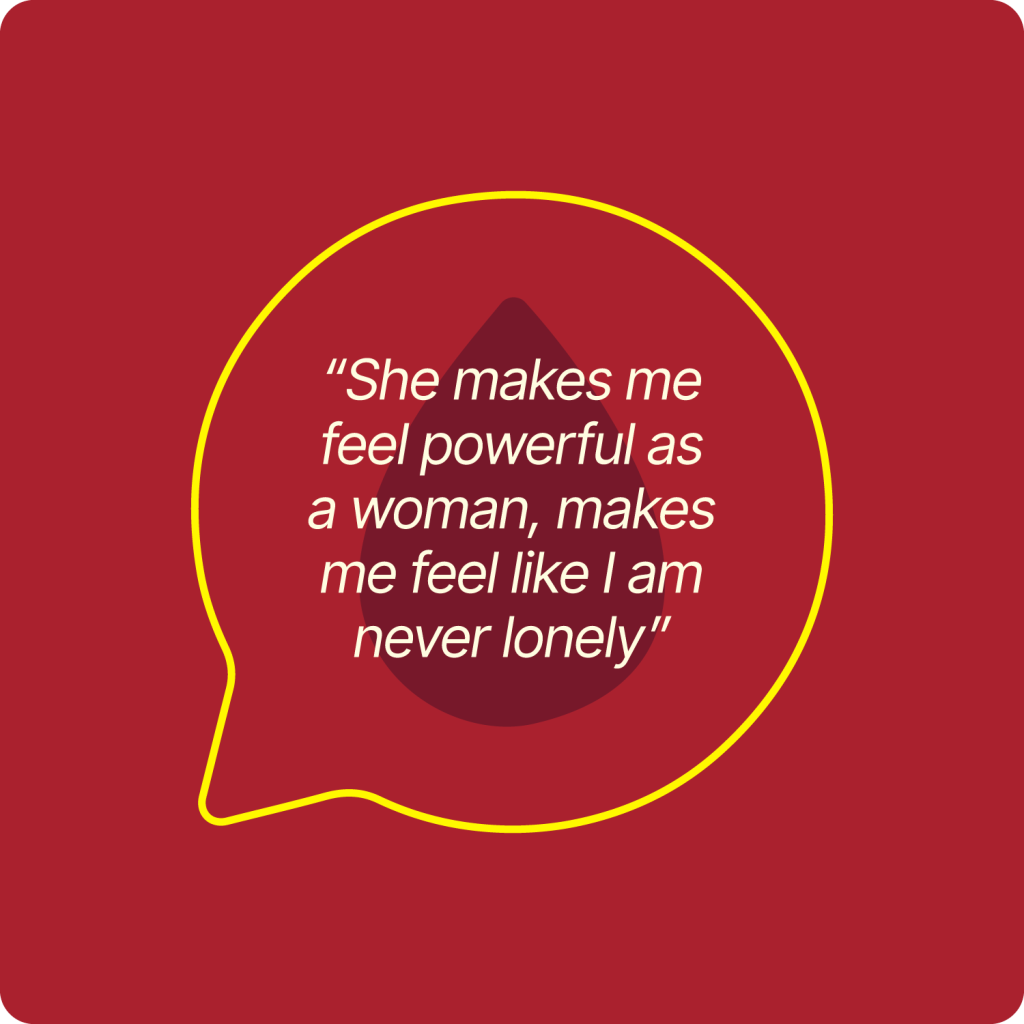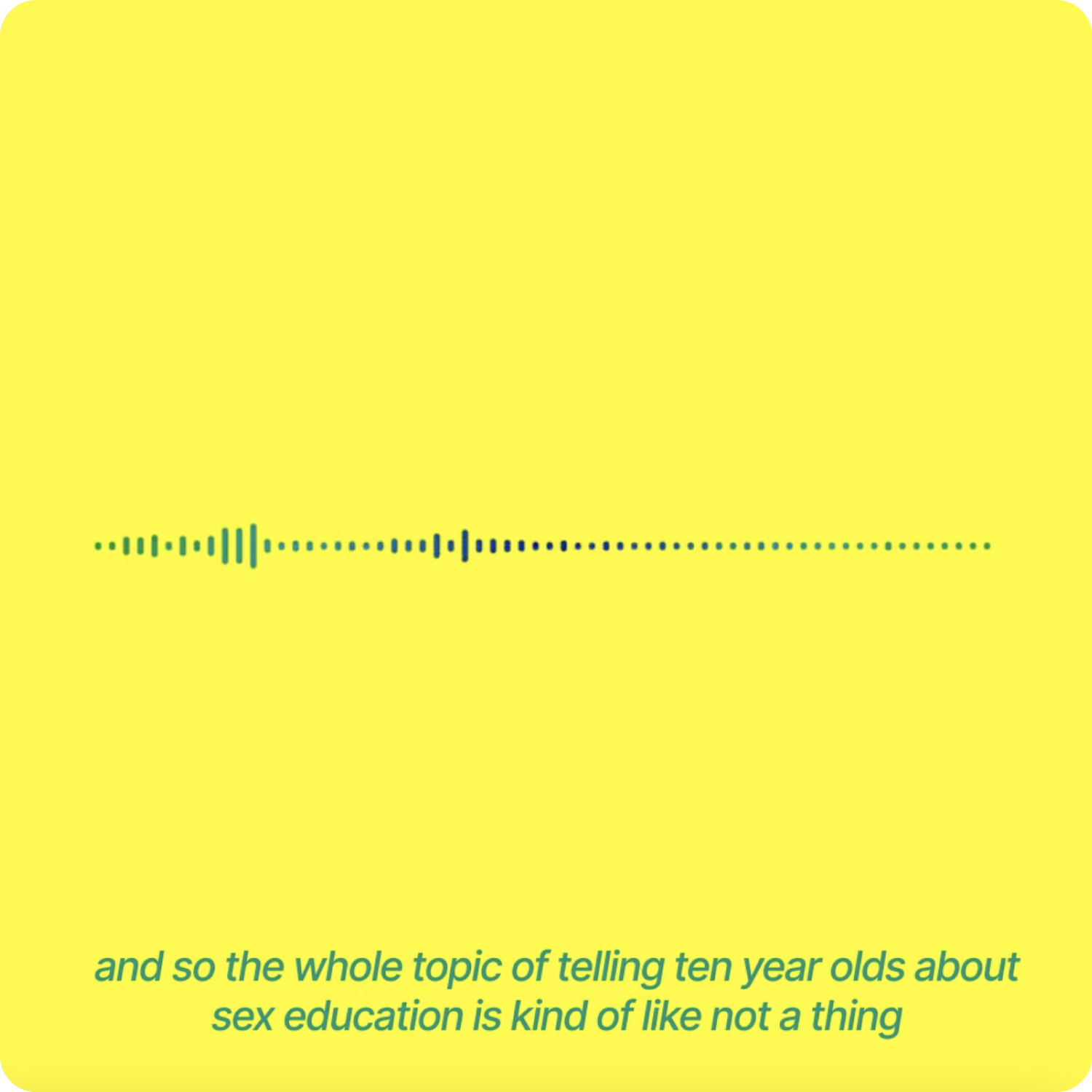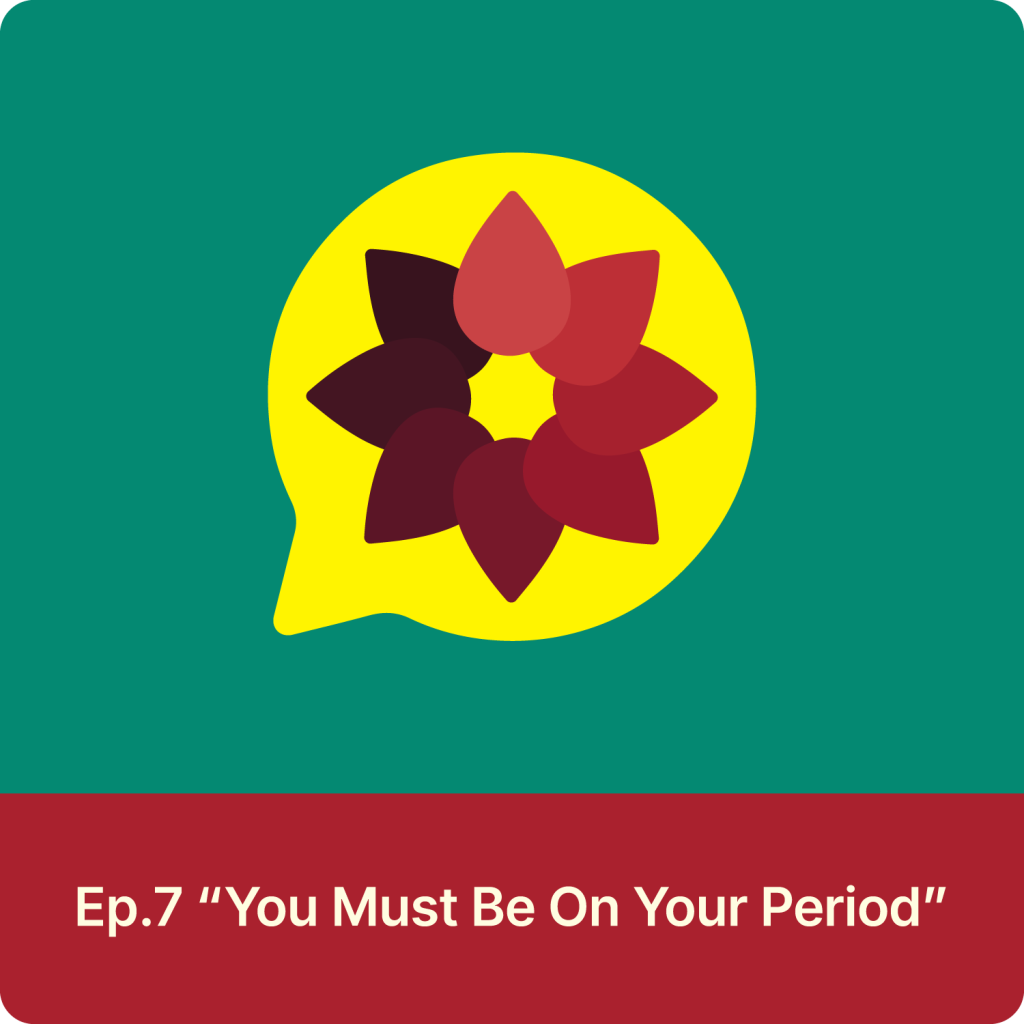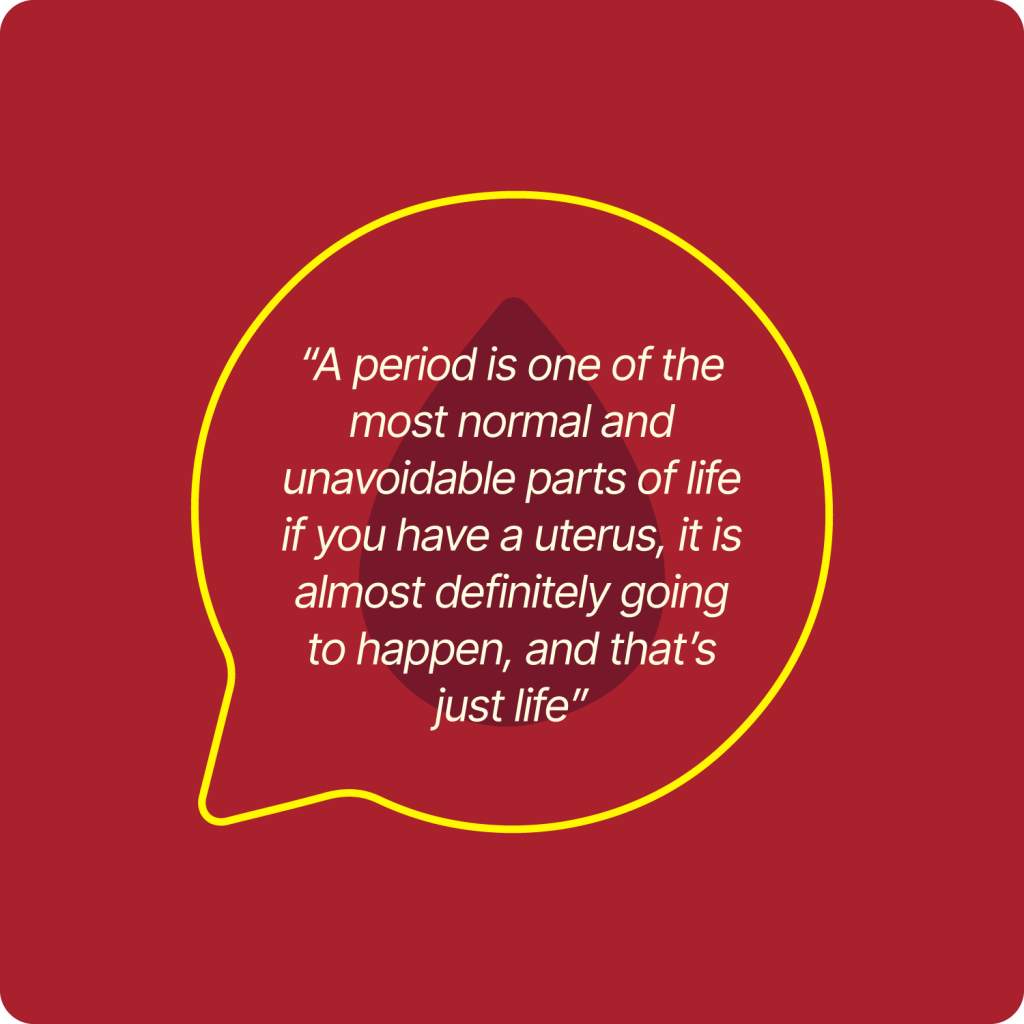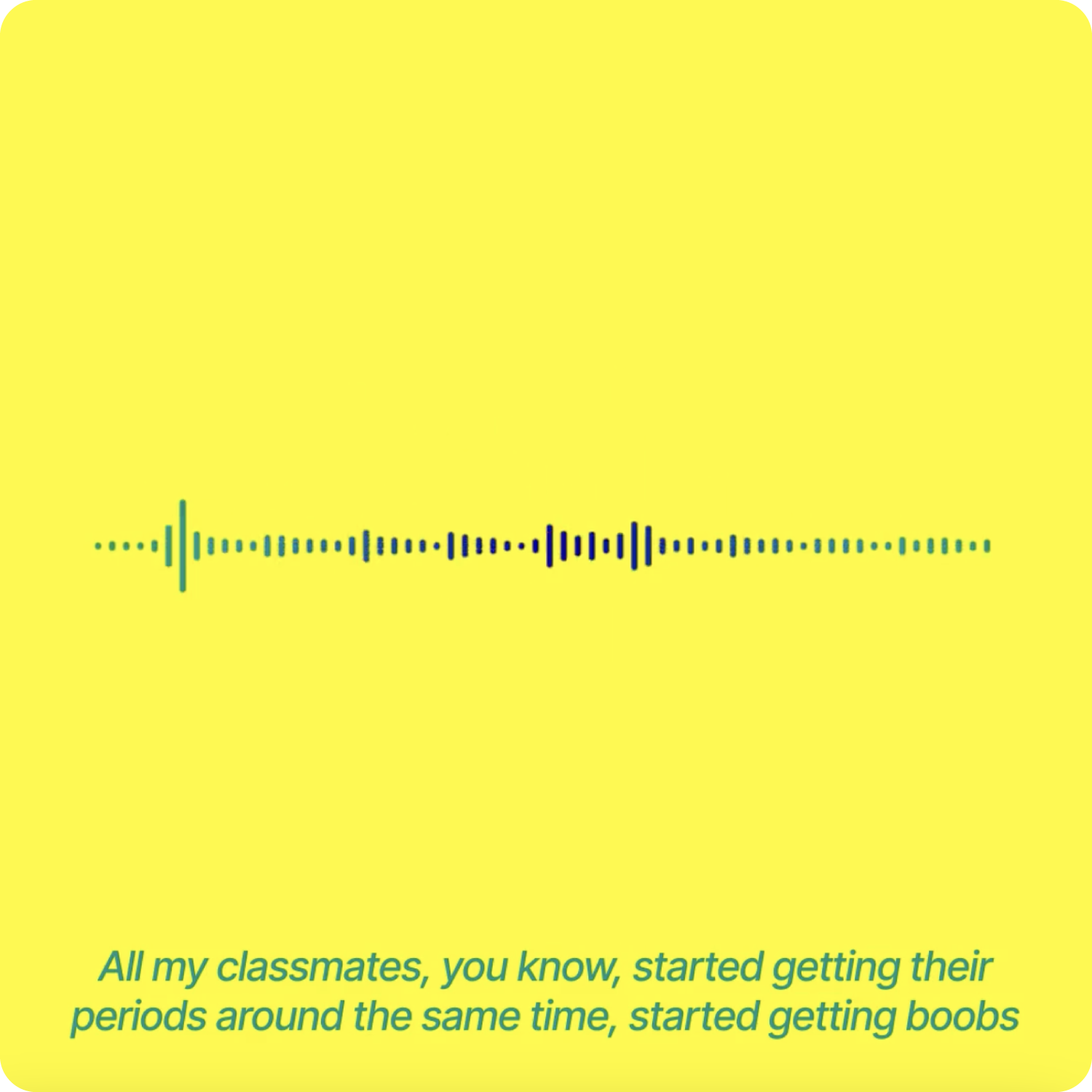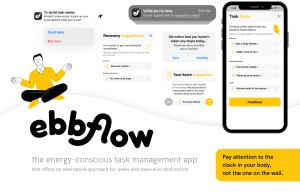- #Activism
- #Branding
- #Care
- #Children & Childhood
- #Community
- #Connection
- #Education
- #Fun
- #Game
- #Health & Health Care
- #Interactive
- #Language
- #Material
- #Material Practice
- #Multidisciplinary
- #Narrative
- #Participatory
- #Political
- #Practice-based
- #Relationships
- #Research
- #Safety
- #Social
- #Sound
- #Storytelling
- #Technology
- #Wellness
- #Women
- #Zine
More Than a Period: Menstrual Health Communication Networks
Priyanka Poulose
See it On Campus: Level 2
Visitor InfoYou will find my exhibit 'Bloom Club + Bloom Talk' in the space outside the Aboriginal Gathering Place.
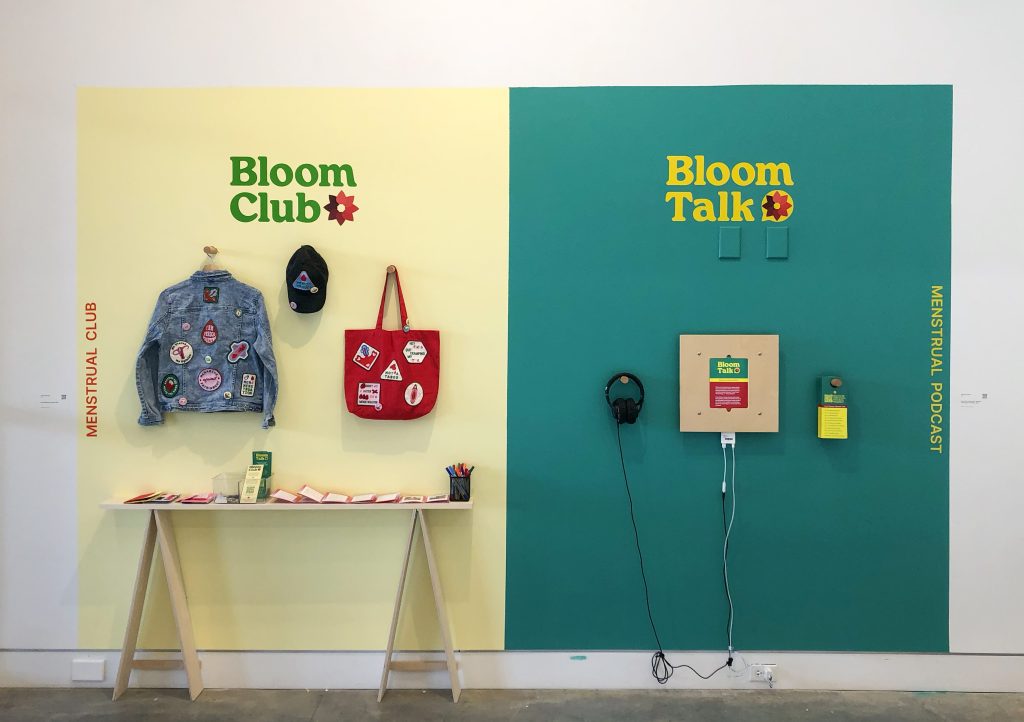
Award Recipient
Governor General’s Gold Medal for Excellence
WA Architects Ltd Master of Design Graduation Award
MDes (Re)Framing Emergent Practices: Interim Thesis Project Development Award 2023-24
Award Nominee
Senior Women Academic Administrators of Canada Graduate Student Award of Merit (Western Provinces)2024
Creative Engagement and Storytelling to Transform the Menstrual Communication Landscape
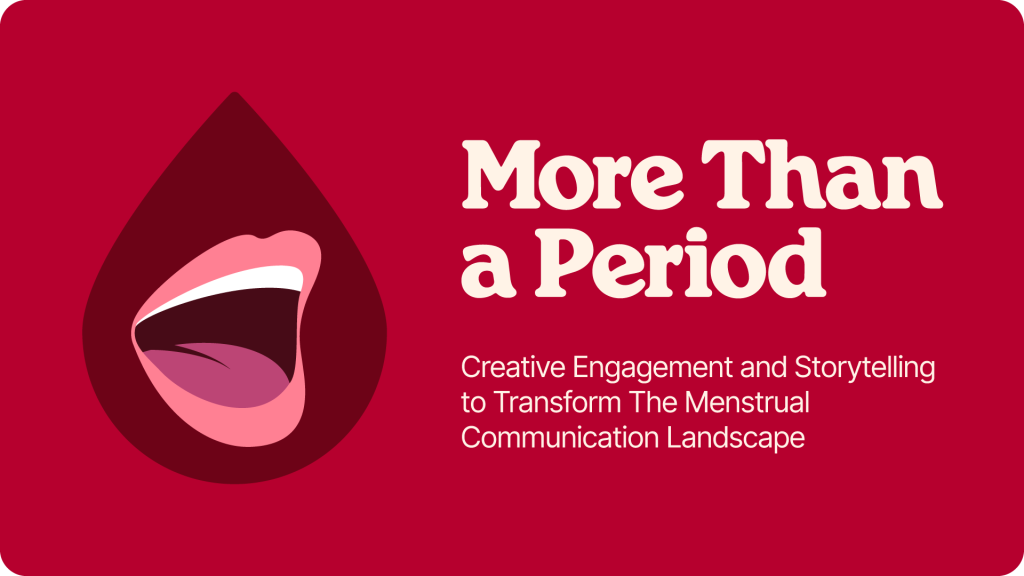
Introduction
Across my design career spanning 7+ years, I have cultivated creative partnerships with companies that have had a social, cultural, or environmental impact. I particularly valued collaborations on the development of products and services for women–whether it was designing the packaging for a modern menstrual hygiene brand (see Plush) or a digital lifestyle community uniting women of different ages and body shapes (see Savage). Moreover, in the private sector, commercial gain often eclipsed societal benefits, which ultimately dictated my design approach. Seeking a paradigm shift that aligned with my moral compass, I envisioned equipping myself with investigative tools to forge design solutions rooted in socio-cultural change. This led me to the graduate design program at Emily Carr University where, building on my interest in women’s health, I began exploring the role of design in social discourse about menstrual health and wellness.
Advocacy and allyship form the backbone of my creative practice. As a woman of colour, aligned with the ideals of feminism and equality, I am resolute in using my design platform to amplify the voices of women in undoing the damaging narratives that diminish our agency and power in the world. Everyday news cycles brimming with horrific tales of sexual assault, violence, and systemic oppression of women around the world, provoke my rage and disgust but also bolster a resolve to harness my design prowess in advocating for women’s rights.
My approach to this research area is a multifaceted engagement rooted in humour, creative engagement, and community building. As much as my project aims to amplify women’s agency, it is also an open invitation for men to be a part of the conversation and learn to be better allies. My process reflects a holistic strategy, emphasising the interconnectedness of design, healthcare, individual, and collective agency. With this research, I have unearthed the true essence of my design practice–an unwavering curiosity coupled with community engagement, all in service of catalysing social and cultural transformation.
Graduate Research
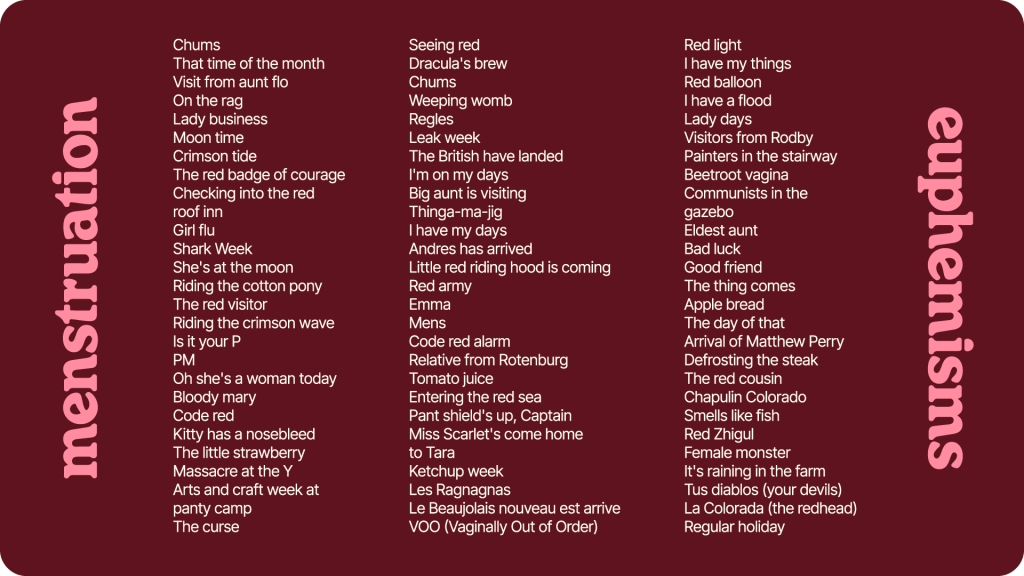
More Than a Period addresses long-standing taboos, misinformation, and negative communication about menstruation that contribute to its persistent stigmatization. It adopts a practice-based methodology led by an auto-ethnographic, reflective, and activism-driven approach to menstruation communication. This research contextualises itself within the current socio-political landscape surrounding women’s reproductive and sexual health rights, marked by escalating incidents of violence, sexism, and systemic oppression against women globally. Societies and cultures perpetuating menstrual stigma are integral components of this overarching oppression. Emphasising the urgency of advocating for women’s agency in decisions that intimately impact their bodies and lives, this research designates menstruation—an intrinsic biological process—as the focal point for advocacy. Informed by 16 years of lived menstrual experience and a background in designing for menstrual healthcare, my research process exemplifies a dynamic field of practice, utilizing tacit knowledge to investigate the psychosocial condition of menstruation, guided by the following research questions:
How can we create meaningful, positive, and open communication
about menstruation?
• What design strategies can be used to remove the socio-cultural stigmas around menstruation?
• How can we safeguard the physiological and psychosocial needs of menstruators?
• What contemporary rituals can be designed to empower menstruators?
Through a combination of ethnographic interviews, discursive artifacts, participatory workshops, arts-based research, and storytelling, my research gathered significant insights into a diversity of lived menstrual experiences and menstrual stigma. This, in conjunction with professional engagements with healthcare organisations like B.C Women’s Hospital, ECU Health Design Lab, and the Centre for Menstrual Cycle and Ovulation Research (CeMCOR), enhanced my knowledge of health design, participatory practices, and communication strategies. The design practice underpinning this research consisted of various interdisciplinary projects intersecting verbal, non-verbal, visual, and written communication, serving as conduits for knowledge acquisition and information exchange.
Key Design Research Projects
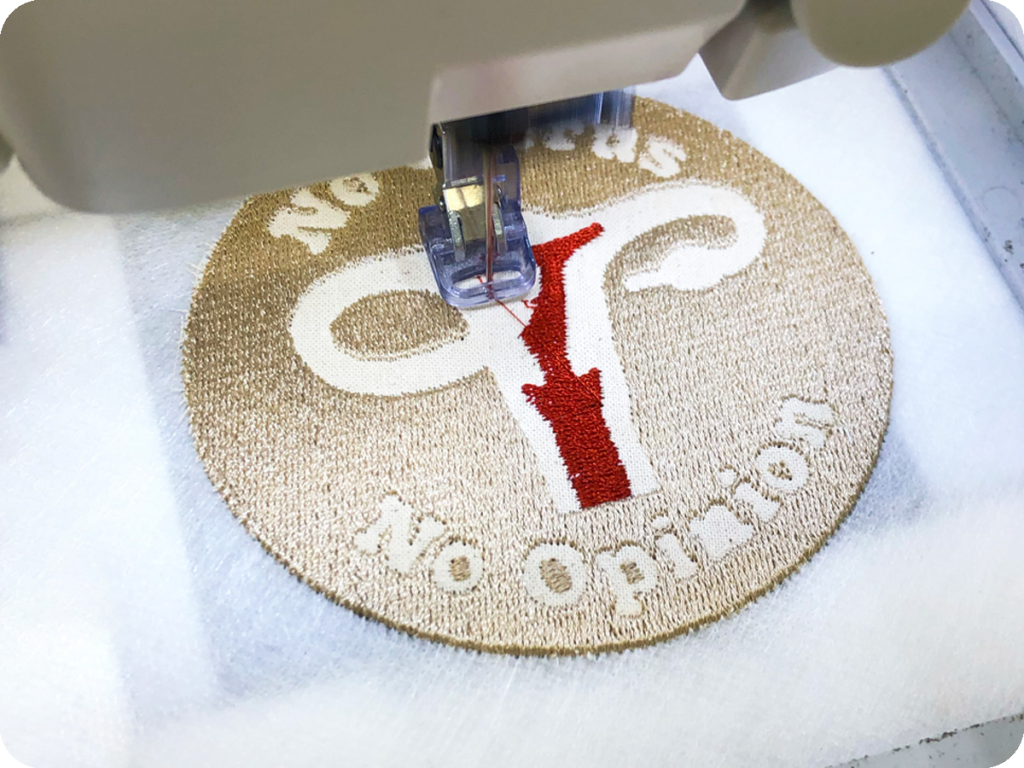
Patches Against Patriarchy
A collection of digitally embroidered patches that facilitate commentary on the societal scrutiny of biological processes like menstruation and the political policing of women’s reproductive rights.
#material-practice #activism #communication #design-for-discourse #advocacy
Nanhi Chidiya
A playful micro-animation that examines the paradox of the celebration of women’s fertility through cultural symbolism and the stigma of menstrual blood in an Indian context.
#animation #media #communication #design-for-discourse #culture #advocacy #activism
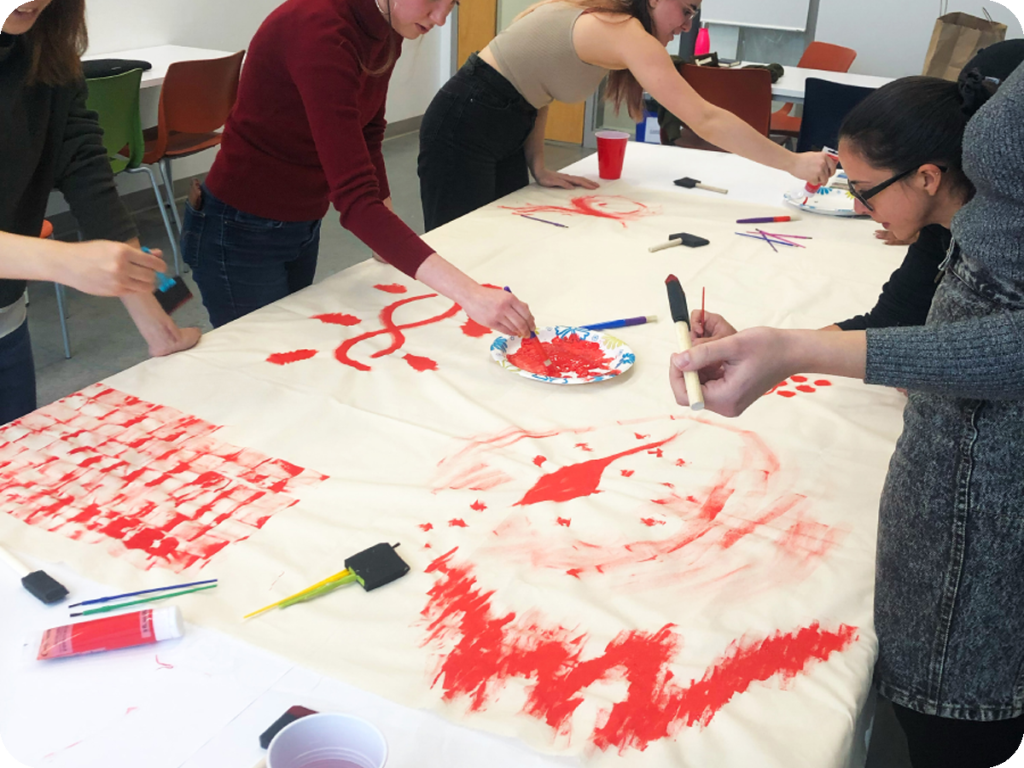
Menstrual Stories
A participatory arts-based storytelling workshop involving menstruators from diverse cultural backgrounds, sharing personal menstruation stories while collectively painting a visual art piece using symbolic red paint.
#participatory #workshop #community-engagement #storytelling #community-building #health-and-wellness
Red Alert
A playful and engaging quiz-style game show uniting menstruators and non-menstruators to cultivate enhanced sensitivity, empathy, and awareness of menstrual stigma, and gain an inclusive understanding of menstruation.
#participatory #workshop #community-engagement #game-design #interactive #community-building #education
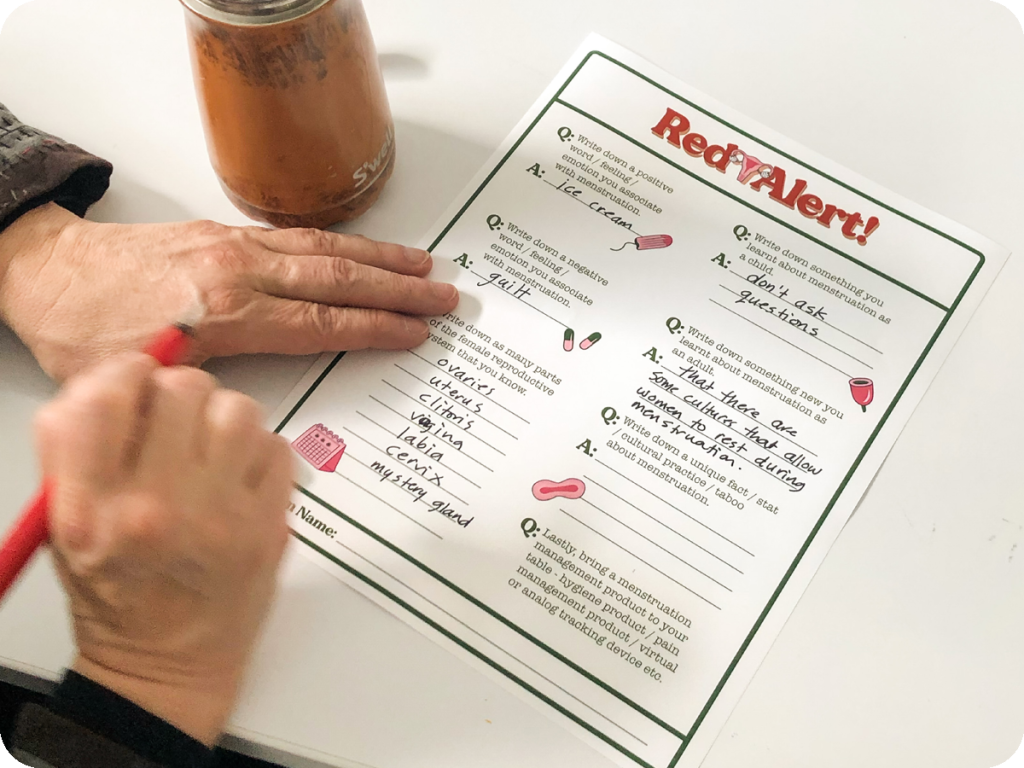
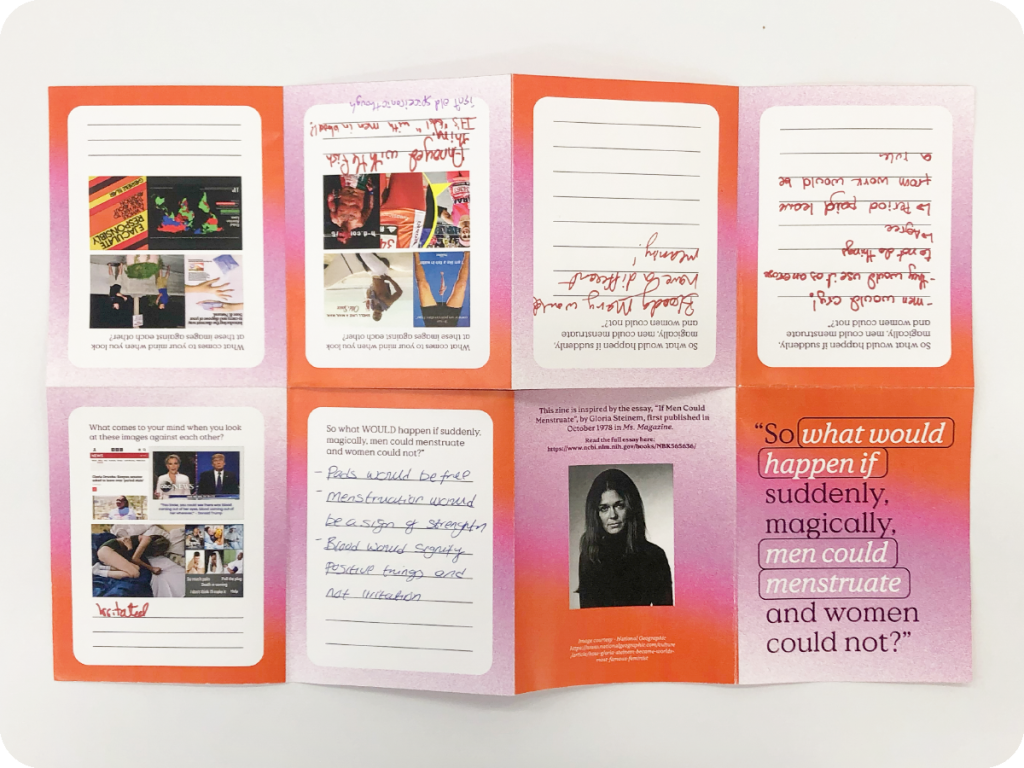
‘If Men Could Menstruate’ Community Zine
A community zine inspired by Gloria Steinem’s seminal essay If Men Could Menstruate, provided a platform for participants to engage deeply with the hypothetical scenario that forms the essay’s central theme: “So what would happen if suddenly, magically, men could menstruate, and women could not?”
#zine-making #community-engagement #participatory-design #interactive #advocacy #activism
Vulva Plushie
An exploration of female reproductive anatomy through the making of a representative material artefact of the vulva, designed as a mechanism to understand the menstruating body in playful ways.
#material-practice #education #communication #community-engagement #interactive #advocacy
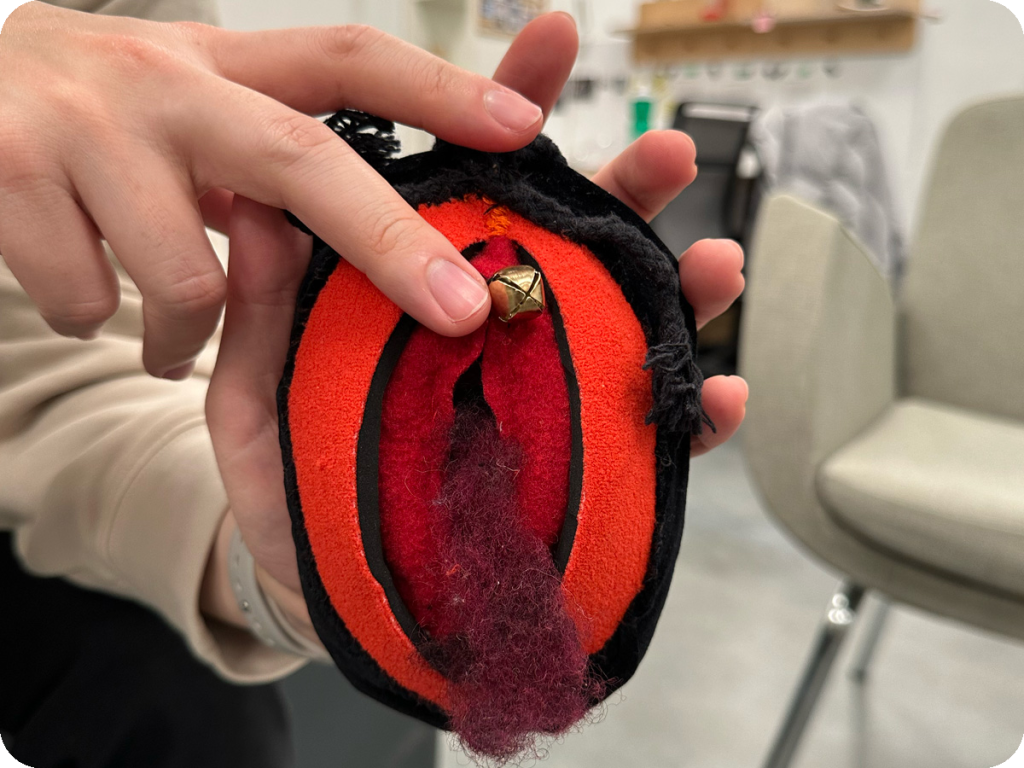
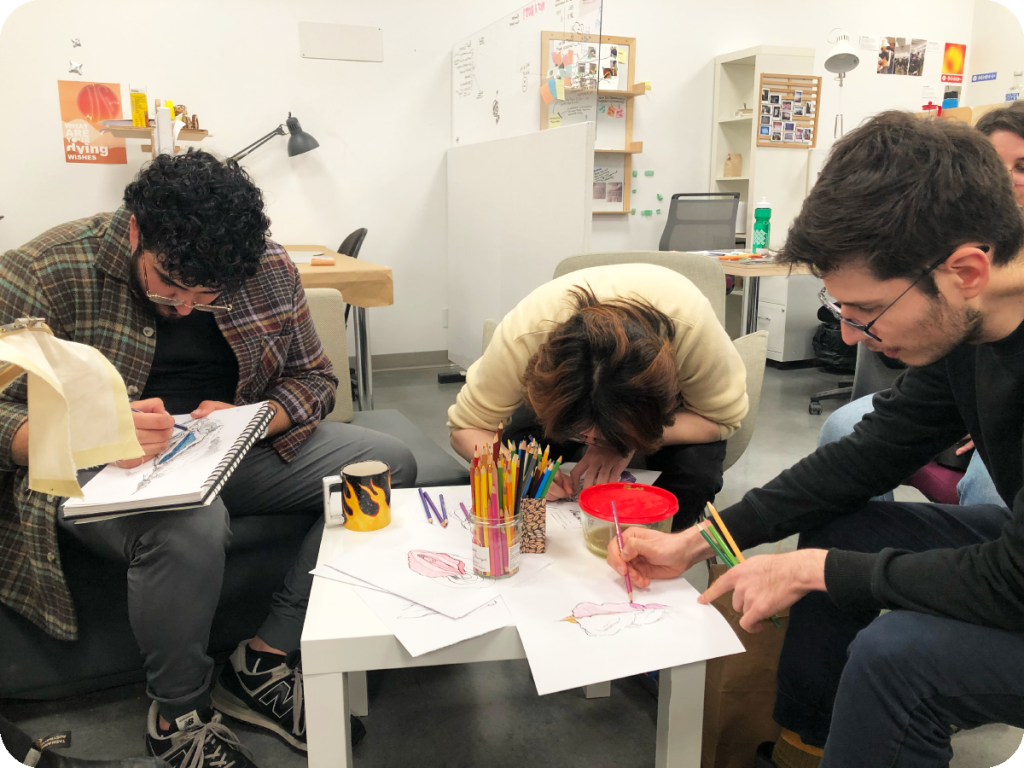
Colour-a-Vulva
A participatory group workshop that engaged participants in introspective discussions about the social taboos and discrimination of women’s bodies while colouring drawings of real vulvas from the Cunt Coloring Book by Tee Corinne. The coloured drawings were gathered and crafted into an accordion-style book artefact.
#material-practice #community-engagement #education #book-making #interactive #advocacy #participatory
Research Outcomes
The practice of this research illuminates the multifaceted exploration of cultural, political, and social dimensions shaping menstruation communication through a practice-based methodology. The pivotal insights derived from the various participatory projects, ethnographic interviews, and professional engagements in women’s healthcare, culminated in the establishment of two interconnected menstrual health communication networks under the name Bloom*—a menstrual club, Bloom Club and a menstrual podcast, Bloom Talk.
*Bloom signifies a transformation from youth to adulthood; a change from negative perceptions to positive attitudes towards menstruation; an emergence of agency and empowerment toward reclaiming the damaging narratives that regulate women’s bodies and bleeding experiences; a blossoming into powerful, confident, responsible, and empathetic individuals who are striving towards de-stigmatizing menstruation.
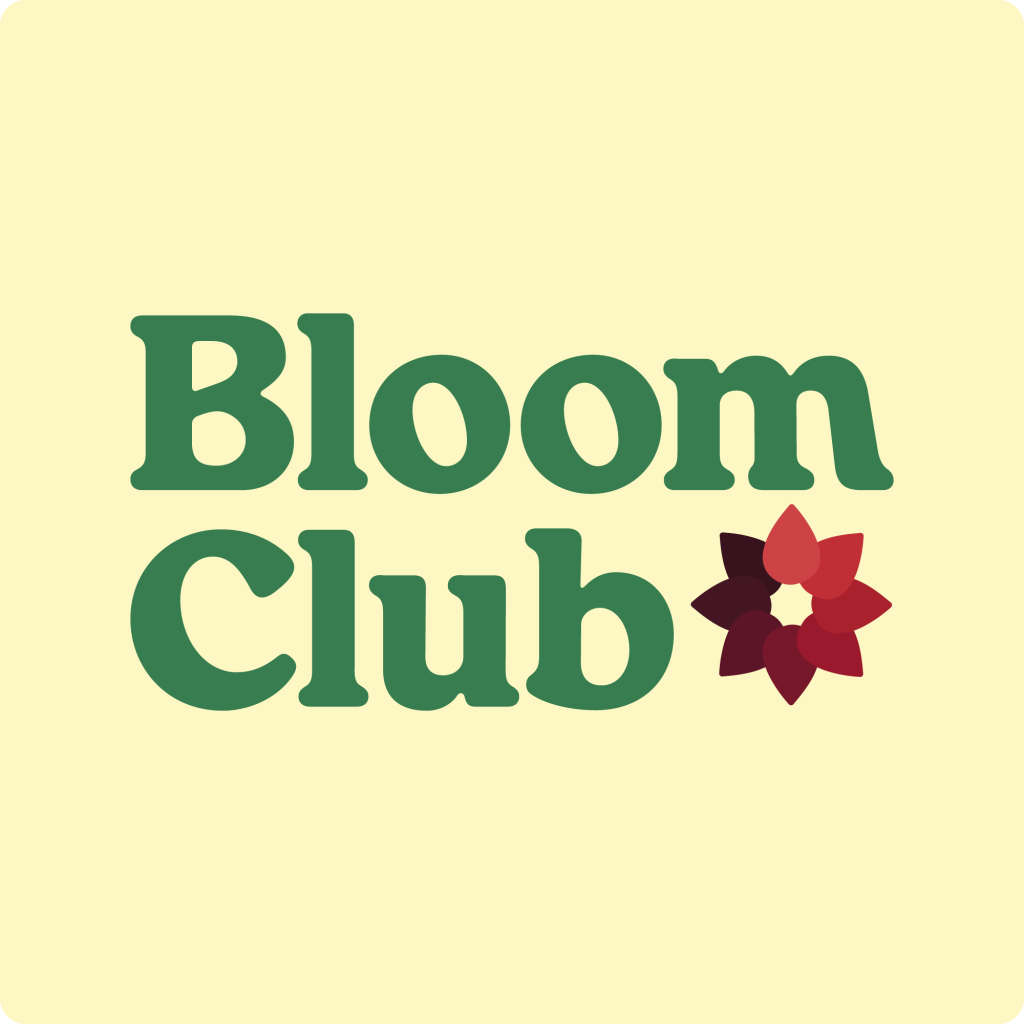
Bloom Club is a vibrant and inclusive community at Emily Carr University, dedicated to dismantling menstrual stigma by providing a safe space for menstruators and non-menstruators to come together as allies. Welcoming all genders, the club engages members in creative workshops like pin-badge creation, zine-making, designing embroidered patches, and stickers. These activities serve as avenues to share lived menstrual experiences and knowledge, creating a platform for activism through self-expression, open discussions, and empathetic understanding. Additionally, the club hosts film screenings, seminars by medical experts, quiz-style games, and storytelling circles, exploring the diverse sensorial aspects to menstrual stigma.
#menstrual-club #community-building #awareness #activism #healthcare #well-being #creative-engagement
Membership to Bloom Club entails a dedication to the menstrual equity movement, signifying individual ownership within a social collective, and establishing a sense of ritual through regular attendance and contribution to the club’s activities. Crucial to establishing the club’s identity is its branding and visual design. The flower icon, incorporating symbolic blood drops as petals, visually communicates the essence of blooming and the diversity in menstrual experiences through eight shades of red petals. The brand palette utilises pastels as the base for stronger colours for a light, non-alarmist, and inviting visual language.
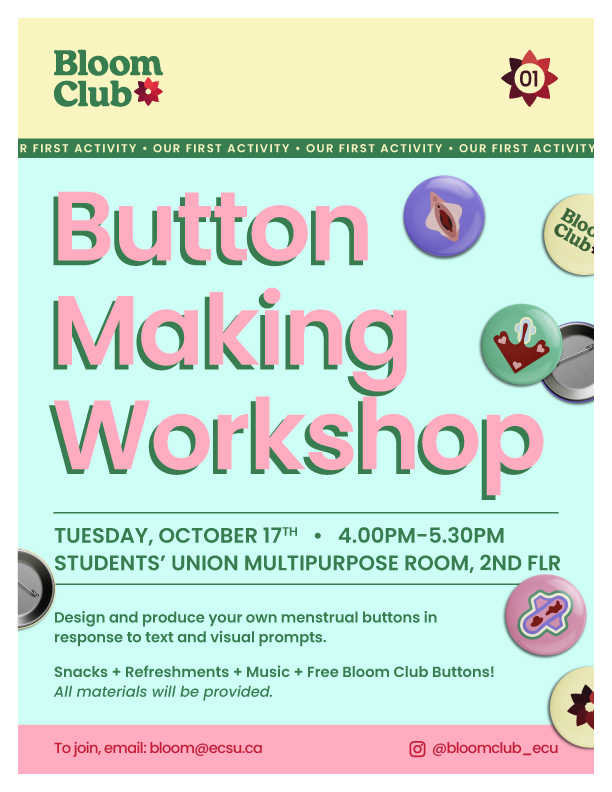
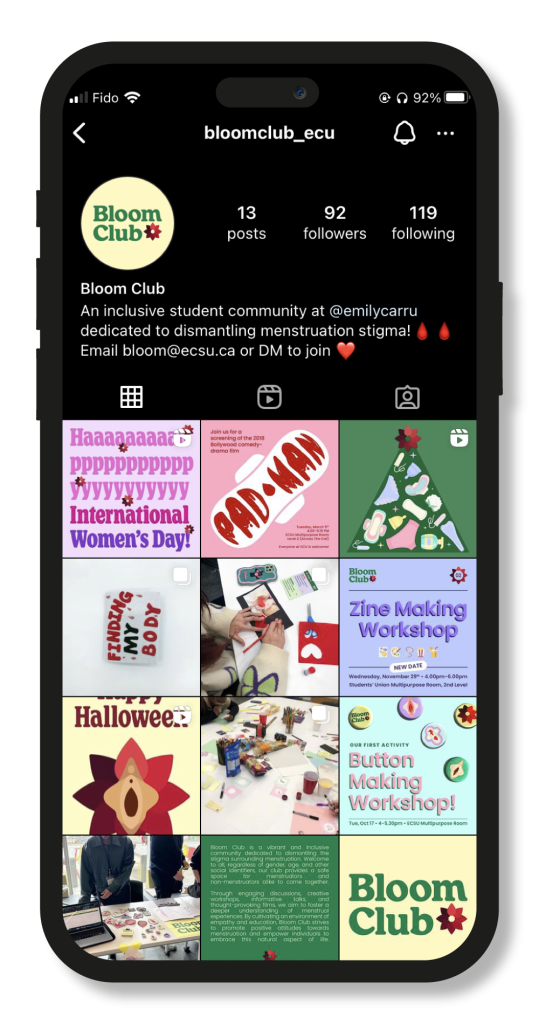
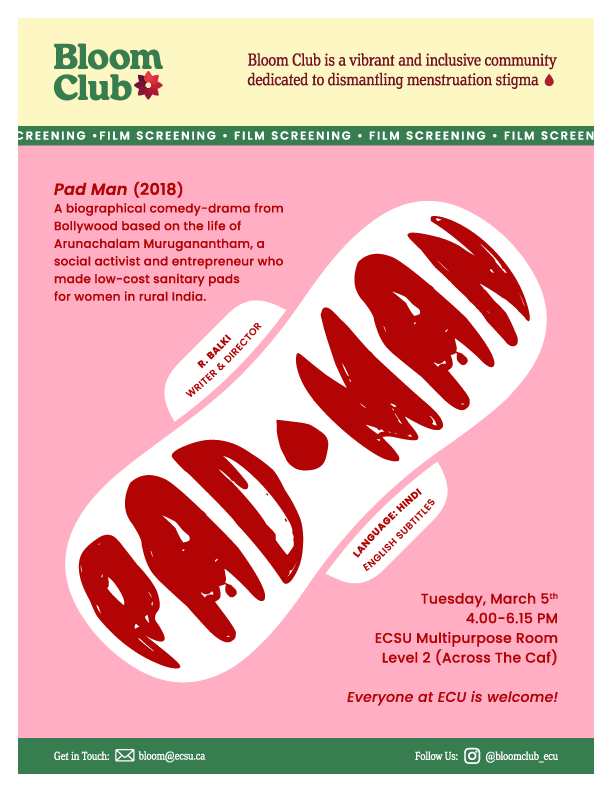
The club’s inaugural event, a button-making workshop included menstruators and non-menstruators from both graduate and undergraduate programs. This workshop aimed to provide a low-fidelity engagement activity for members to express their thoughts and feelings about menstruation through designing pin buttons. Equipped with prompt cards and visual cues for inspiration, the session witnessed an assortment of participants’ creative expression–from curiosity about menstruation to menstrual activism and personal frustrations with the healthcare system.
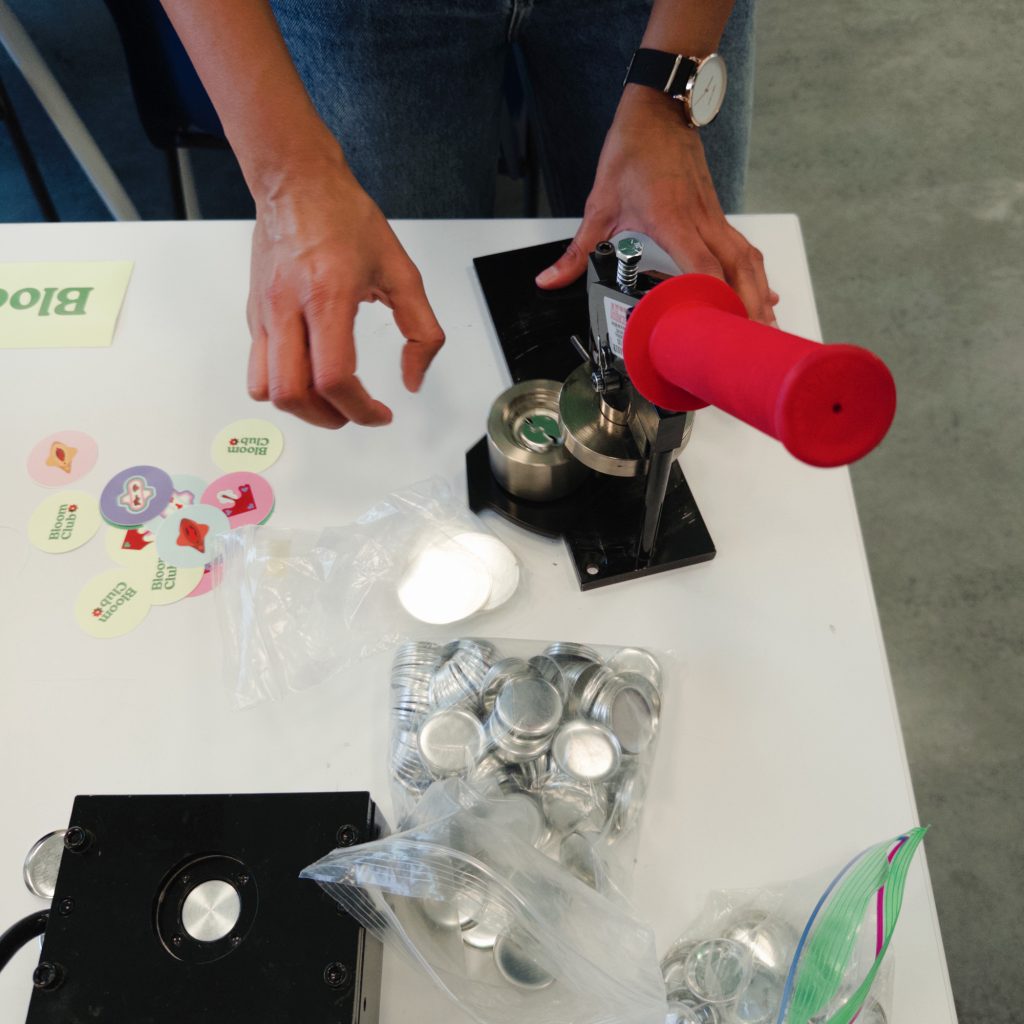
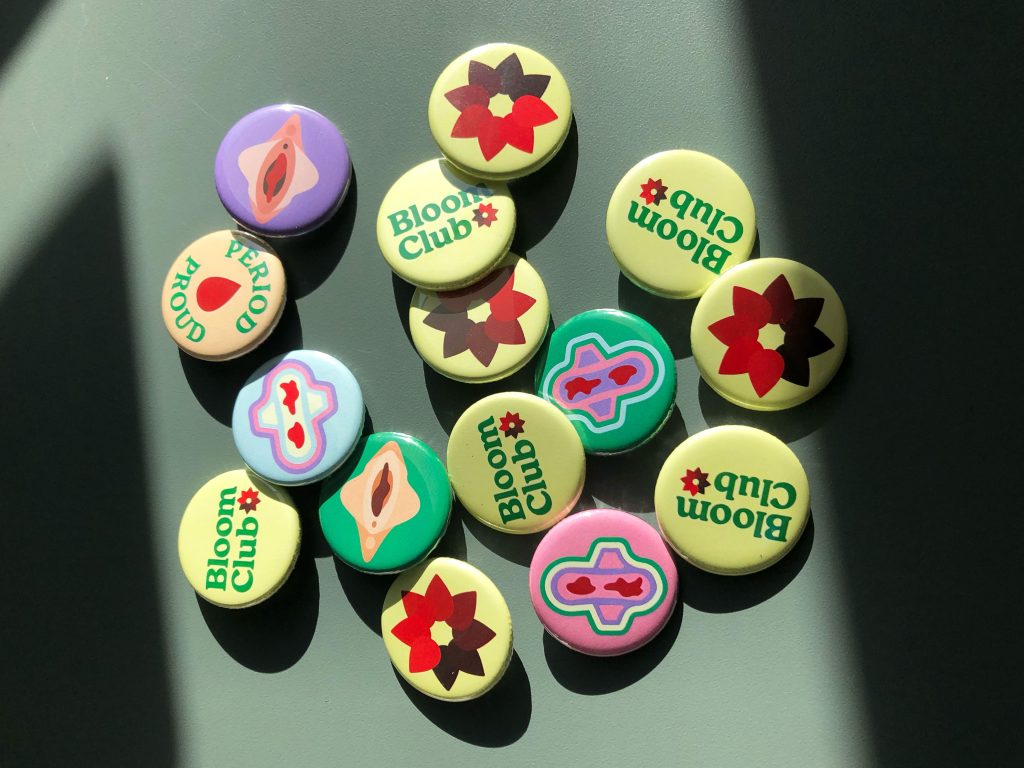
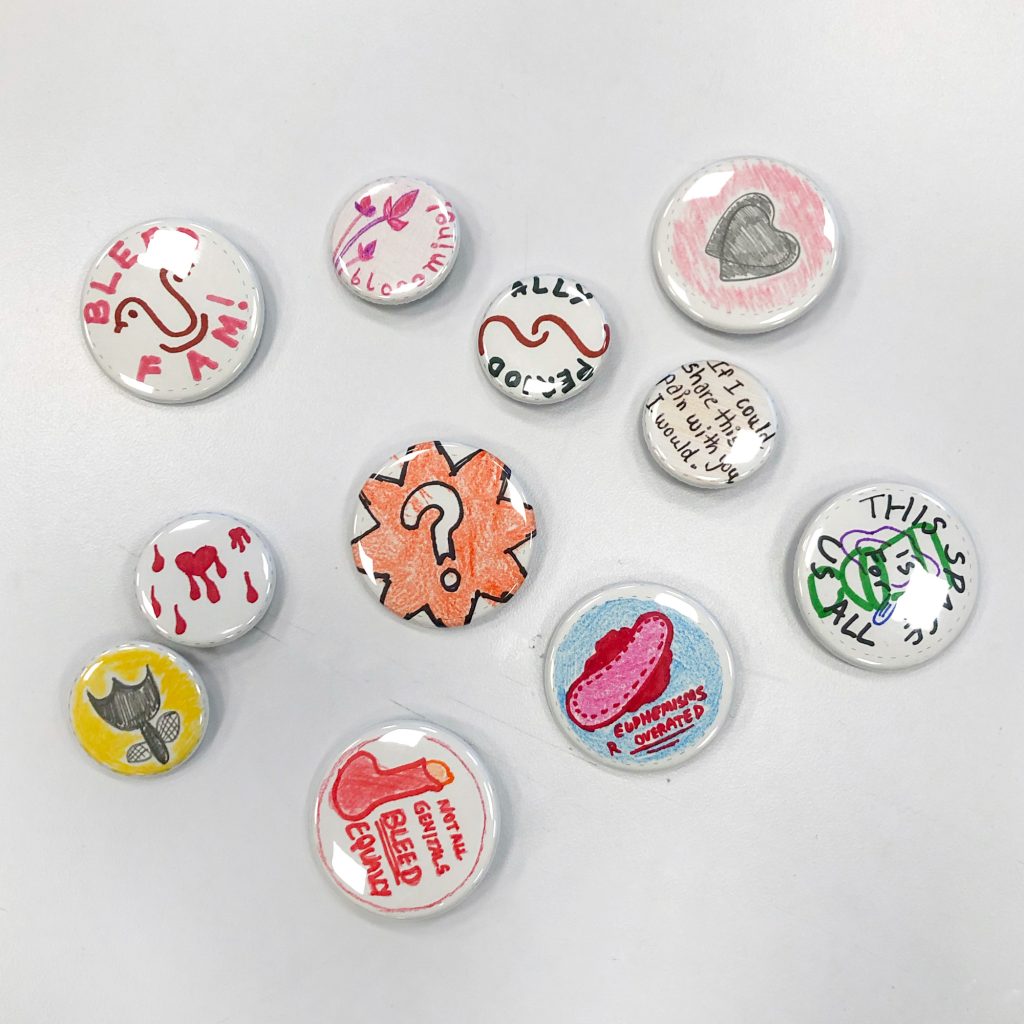
The overall success of this workshop was underscored by the positive atmosphere, where participants freely shared their lived experiences. Non-menstruators demonstrated support, curiosity, and a desire to be allies, fostering an environment that made menstruators more comfortable in sharing their personal histories. The session touched upon topics like endometriosis, prompting participants to express interest in having a medical expert provide relevant information about other menstruation-related health conditions. Feedback collected post-event indicated positive emotions such as happiness, empowerment, excitement, feeling supported, and expressiveness among participants. This workshop not only succeeded in creative self-expression but also served as a platform for meaningful dialogue and understanding of menstruation within the ECU community.
Another major club activity was a zine-making workshop that provided a platform for participants to visually explore menstrual health-related practices, challenges, and support strategies by way of a tangible artefact as a means of bringing attention to these issues without the limitations of language and the burden of complex medical terminology. The workshop encouraged participants to utilise their hands as intuitive tools of expression in creating a more permanent record of their thoughts and experiences. The overarching purpose of this workshop extended beyond the creative process. It aimed to identify community concerns, paving the way for potential interventions such as inviting a medical expert or revealing internal resources and support strategies to address these issues collectively. Through its artistic approach, it sought to amplify the voices and experiences within the student community, fostering a collaborative and supportive environment for dialogue and action on menstrual health and wellness.
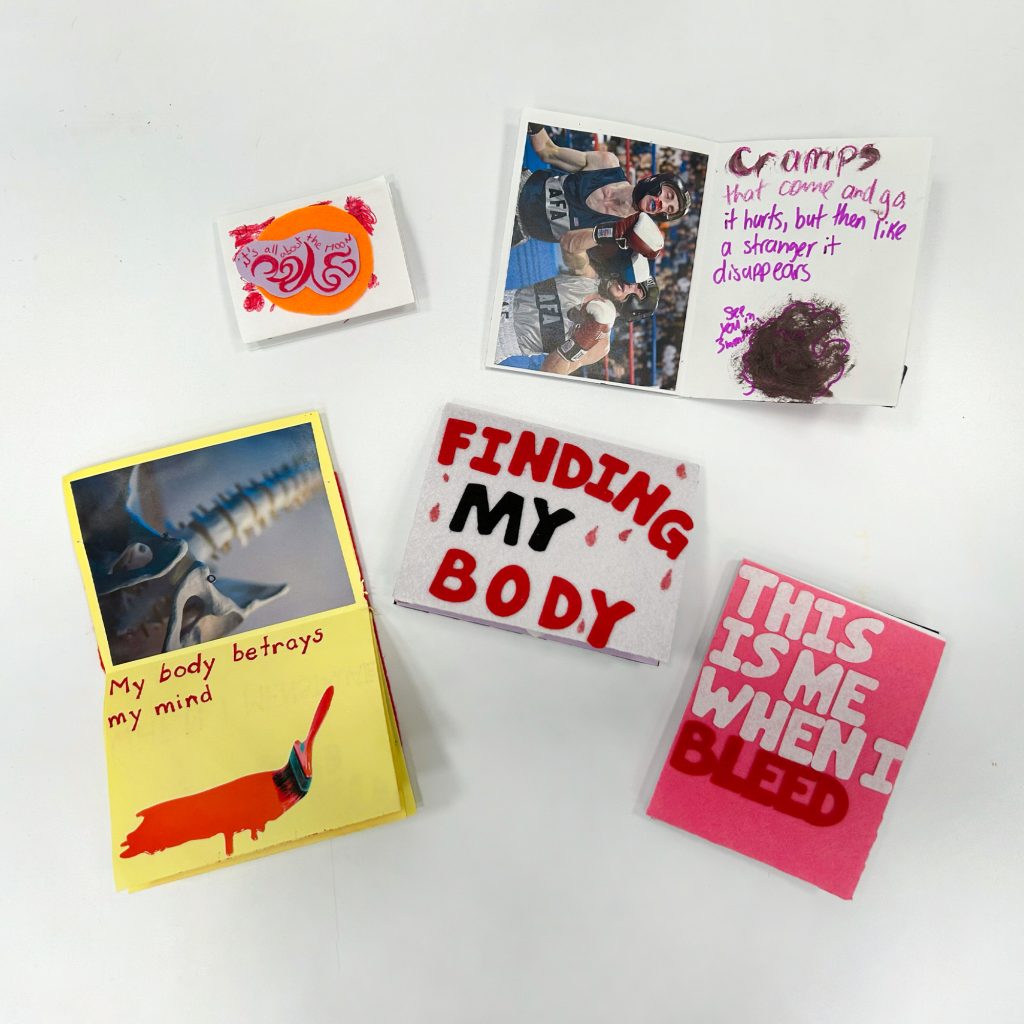
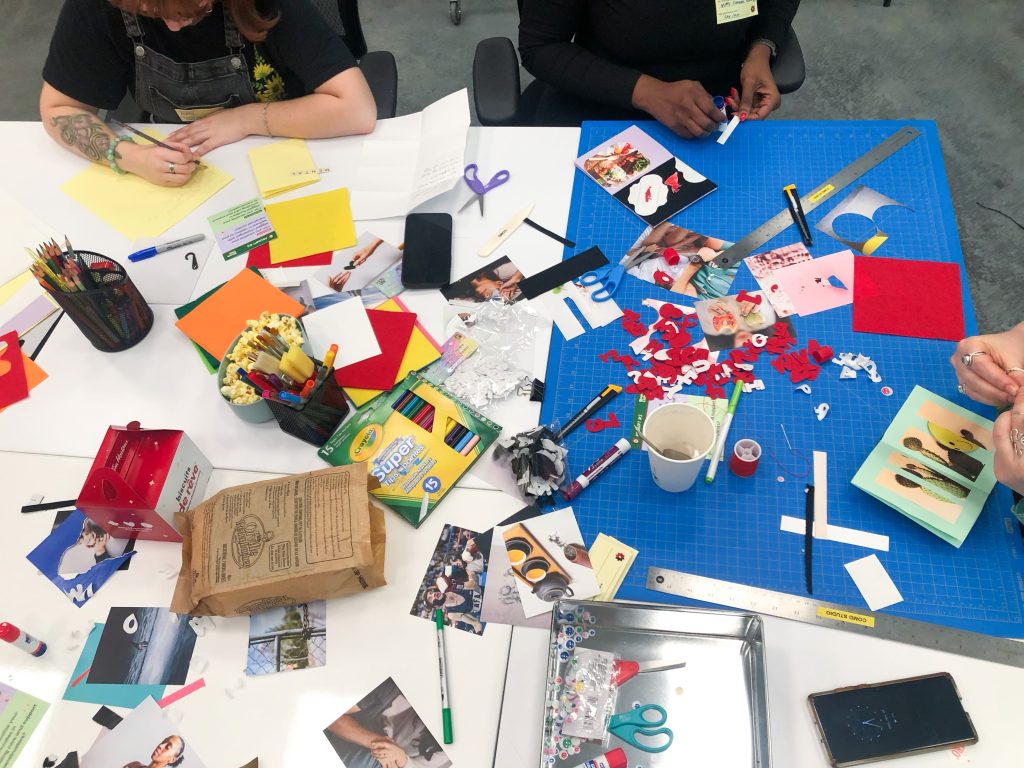

This workshop brought to light shared experiences around food monitoring, pain medication, and stress management during menstruation that have a significant effect on the body image, physical capability, and mental wellness of menstruators. The self-expressive quality of zines as communication tools vividly captures the emotional and physical landscapes traversed by menstruators of varied gender identities, sexual orientations, and cultures. Themes of self-love, complex familial relationships, taboo cultural practices, and the quest for understanding one’s body emerged as recurrent motifs. The workshop not only served as a creative outlet but also as a platform for communal introspection, fostering a deeper understanding of different menstrual challenges and triumphs interwoven with physical and mental health, identity, and well-being.
Images from various Bloom Club Activities
(Follow @bloomclub_ecu on Instagram)
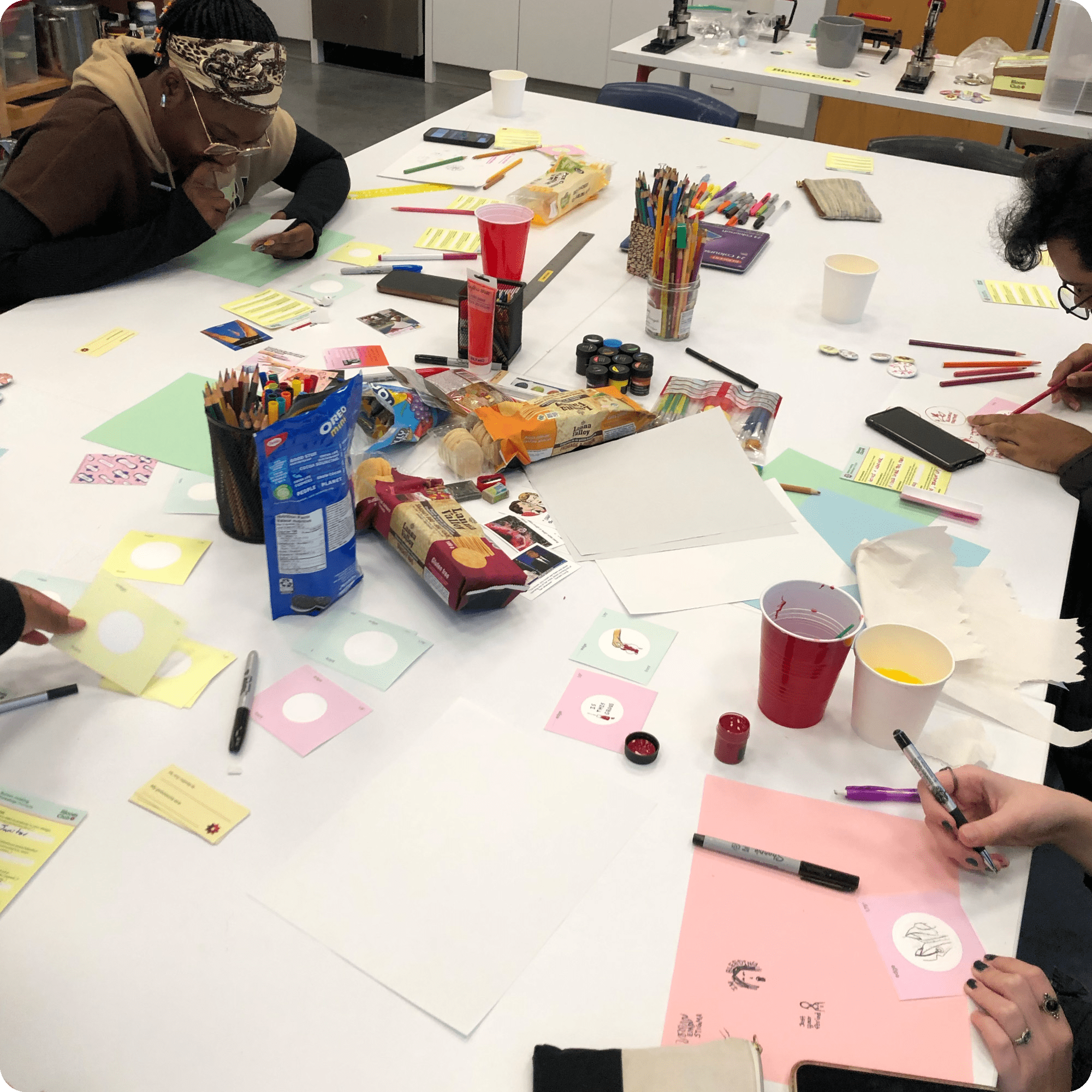
Bloom Club Button-making workshop
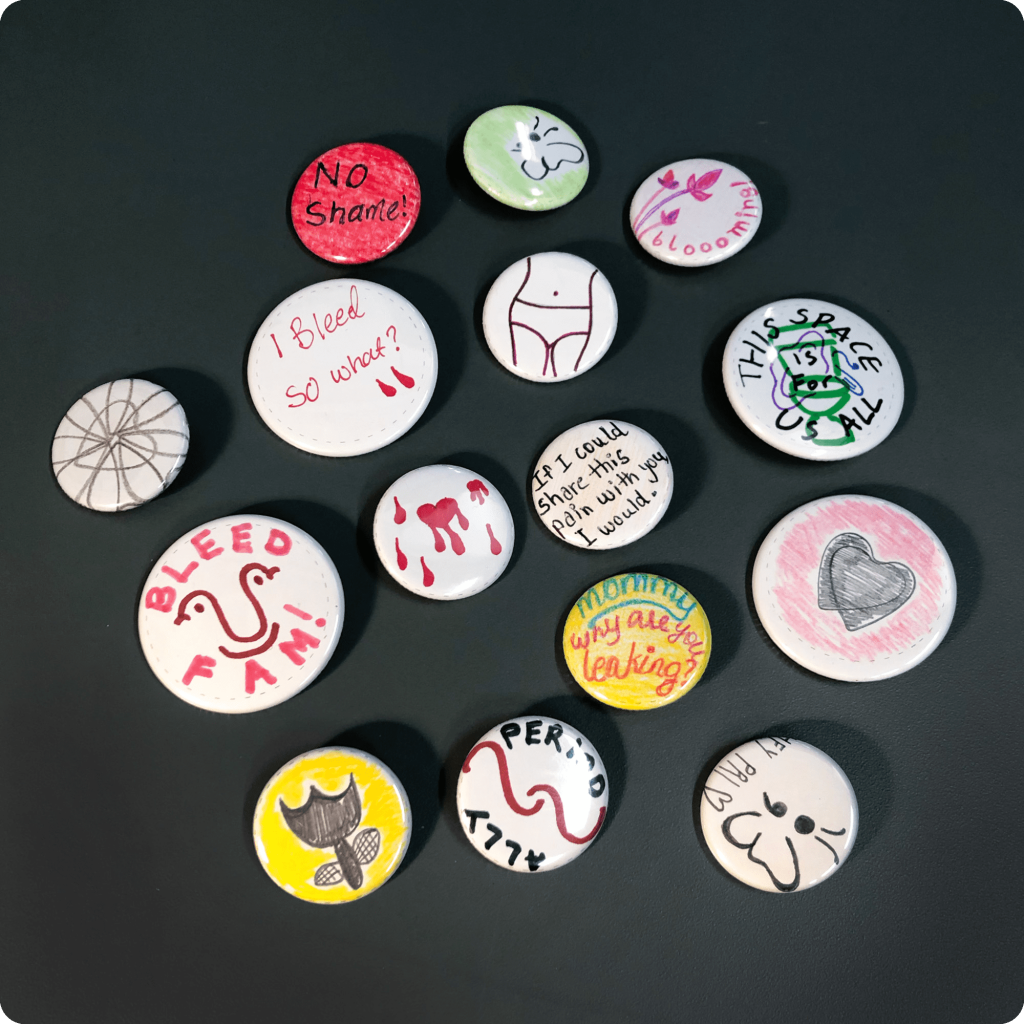
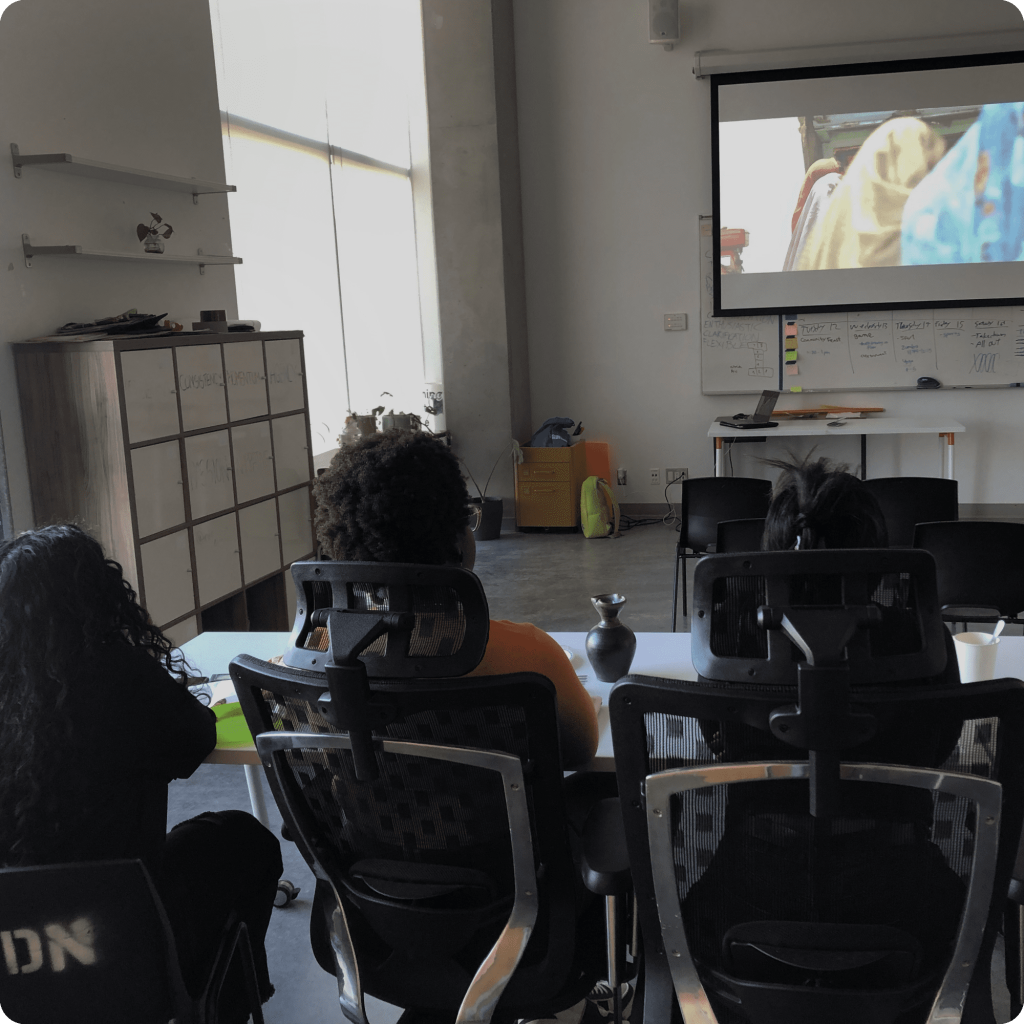
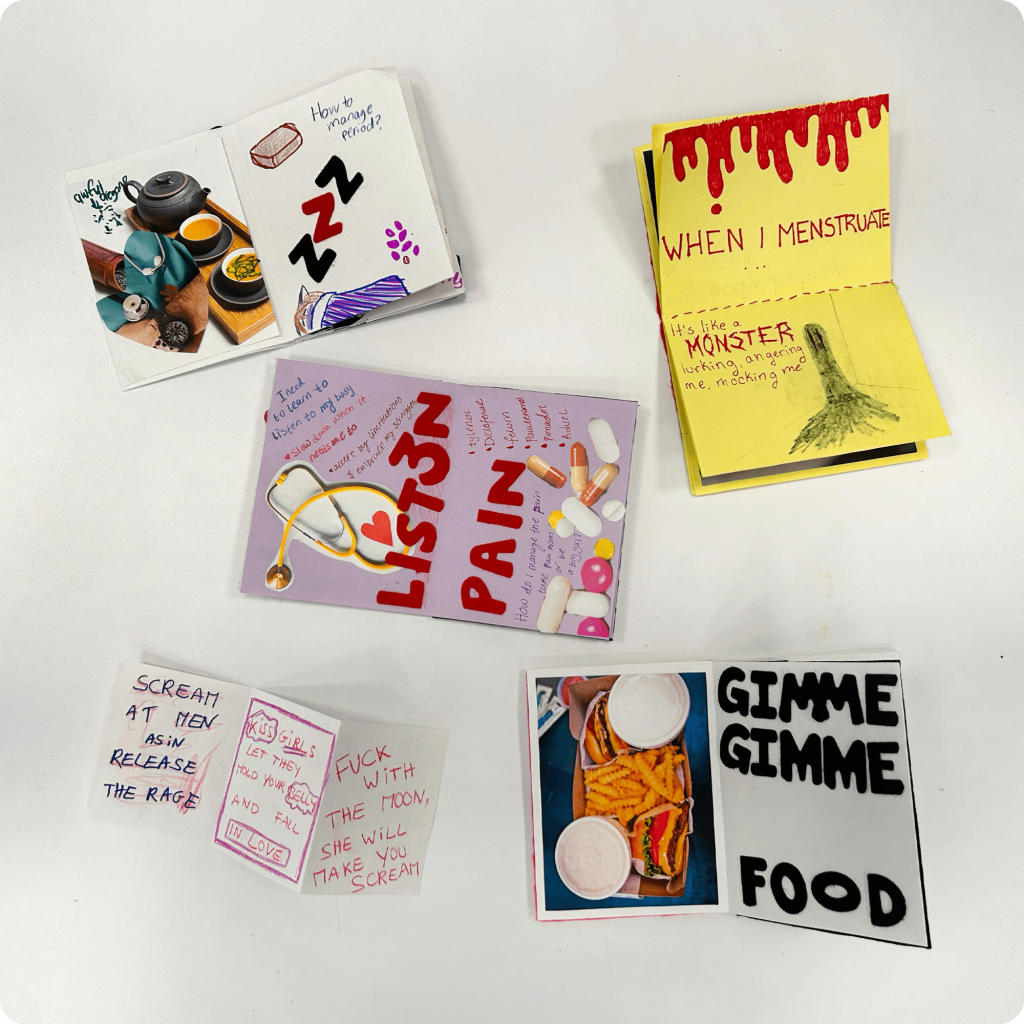
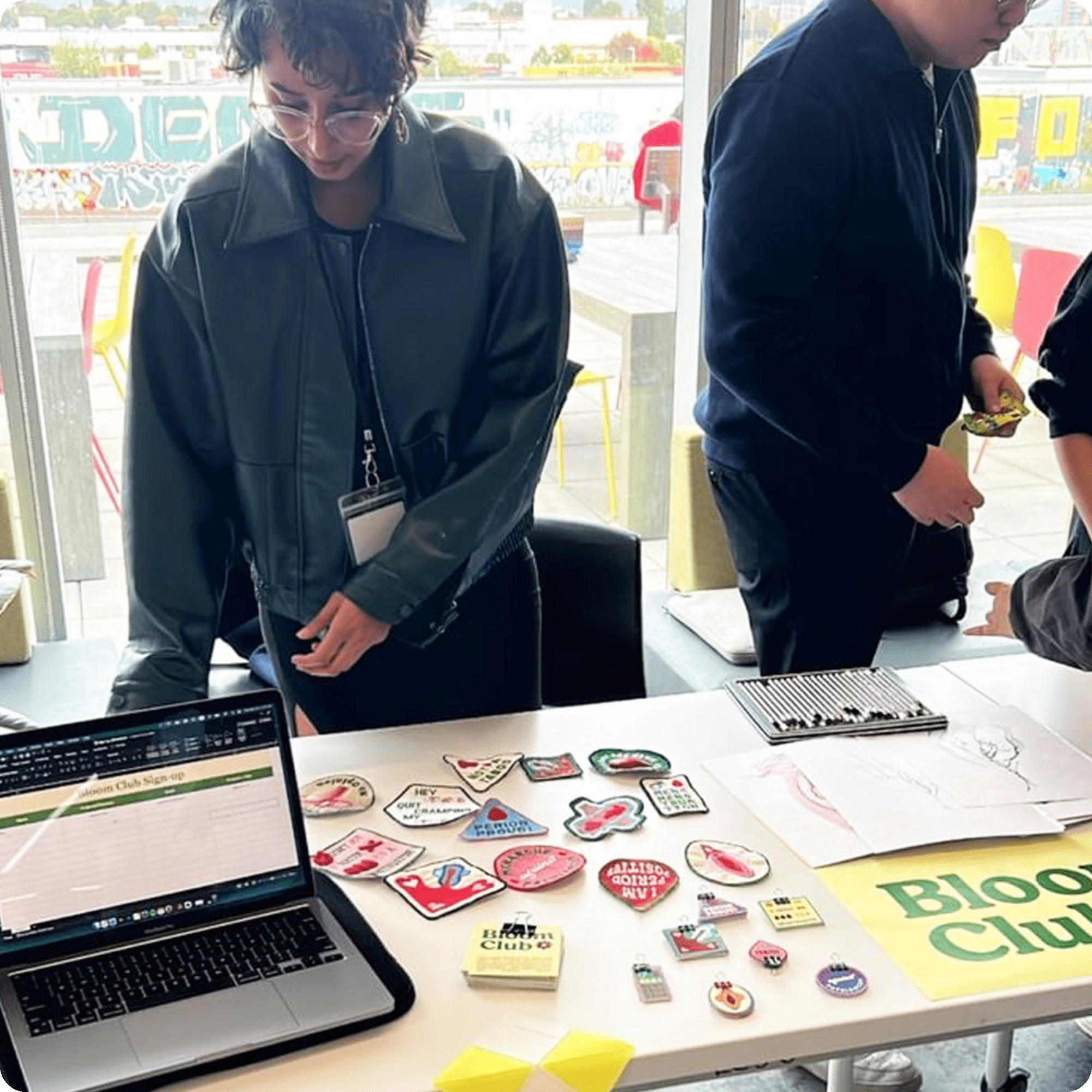
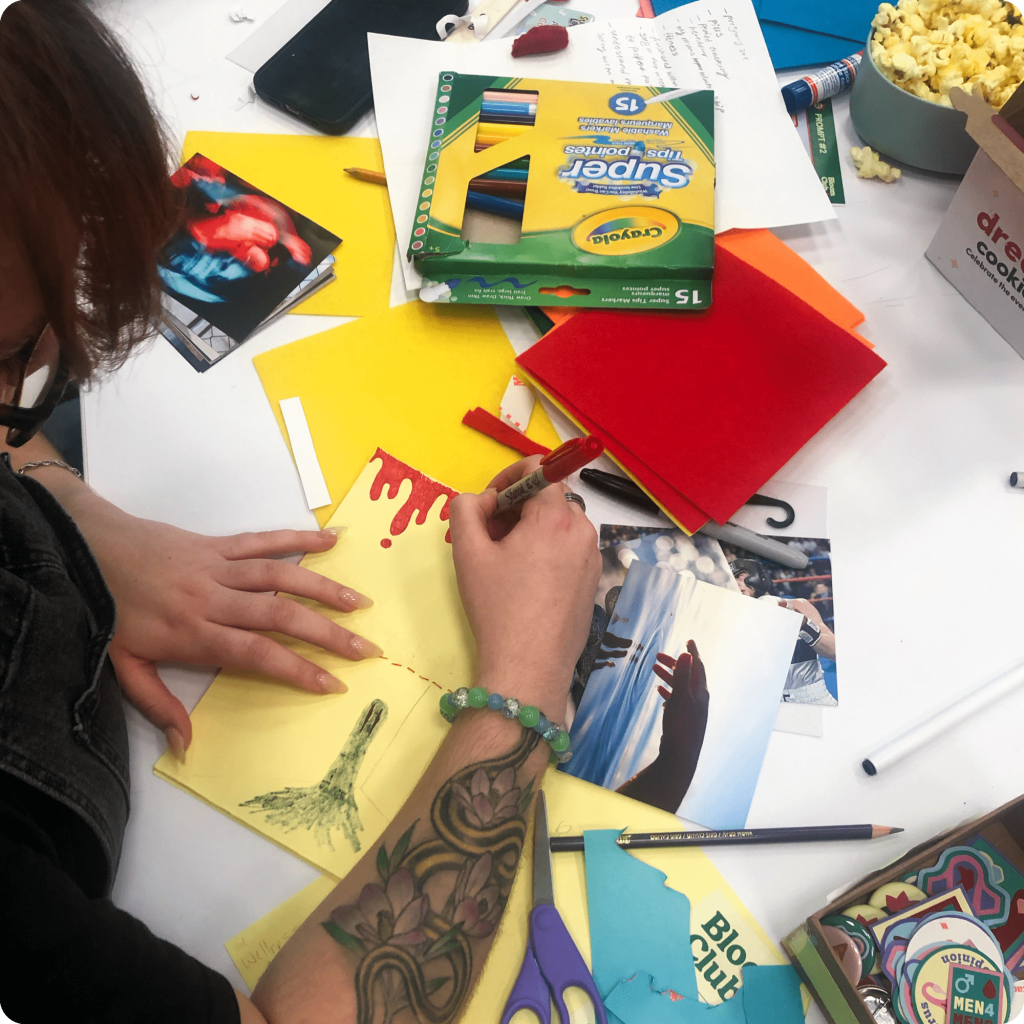
Bloom Club Zine-making Workshop
Throughout the progression of this research, each Bloom Club meeting and participatory workshop provided a platform for the sharing of personal narratives aurally. These encompassed a range of experiences, from formative encounters with periods to distressing incidents related to menstrual health as well as affirming tales depicting the crucial support of understanding family members during painful cramps. Additionally, stories of allies confronting period shaming emerged, alongside heartfelt tales of the complexities of gender identities, positive stories exuding a sense of period love, and a myriad of other tales. Intrigued by these unique histories and inspired to explore beyond the Bloom Club community, the concept of a menstrual podcast took root. Departing from conventional design methodologies, the podcast format embraces the unstructured nature of storytelling, recognising its potency in unveiling personal histories and varied perspectives.
Bloom Talk is an audio podcast that seeks to unravel the multitude of menstrual experiences through authentic storytelling. An experimental form of practice-based research, this project intersects digital communication, broadcasting, community building, and healthcare. By breaking the silence around menstruation, the podcast constructs a collective narrative that empowers menstruators and promotes a deeper understanding among listeners. By connecting with a diverse collective, the podcast aspires to challenge normative perceptions and effect a shift in the societal discourse surrounding menstruation and menstrual health practices.
#menstrual-podcast #community-building #awareness #activism #healthcare #storytelling #digital #audio
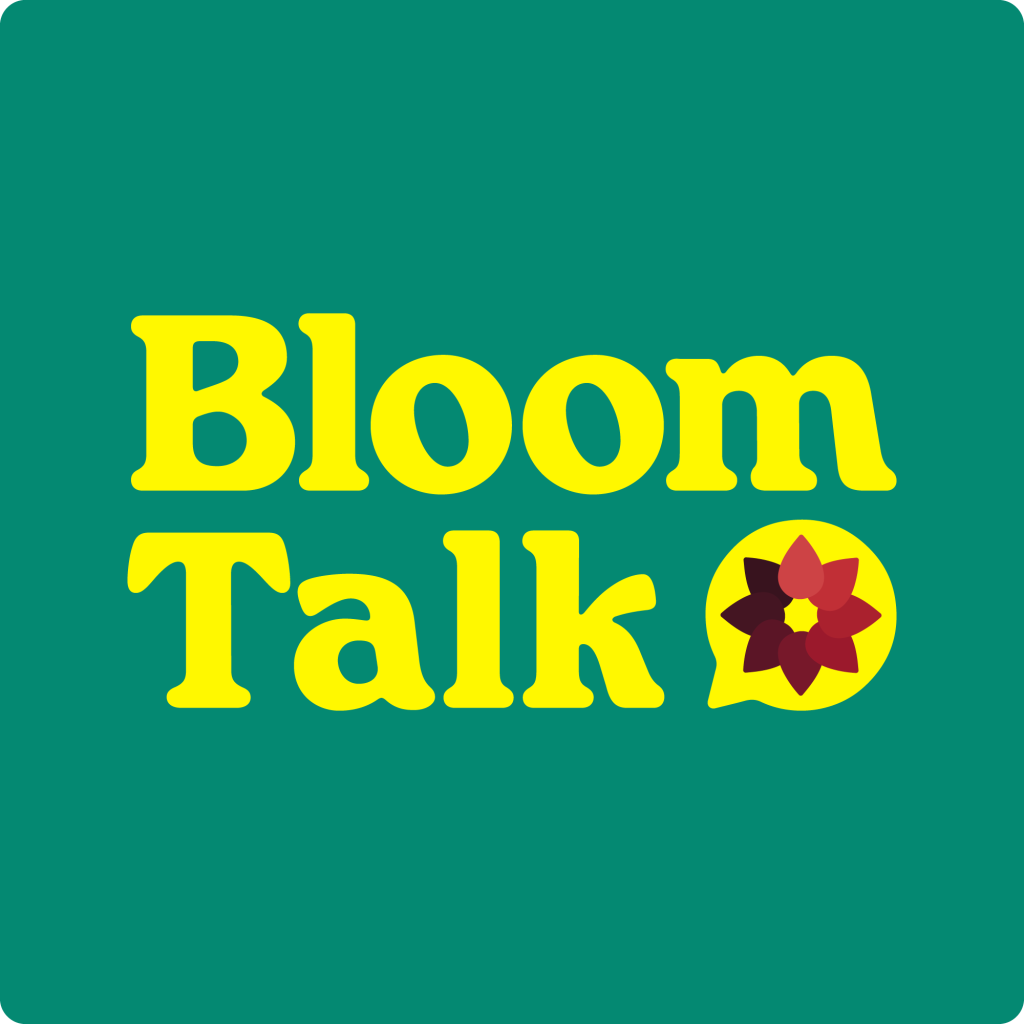
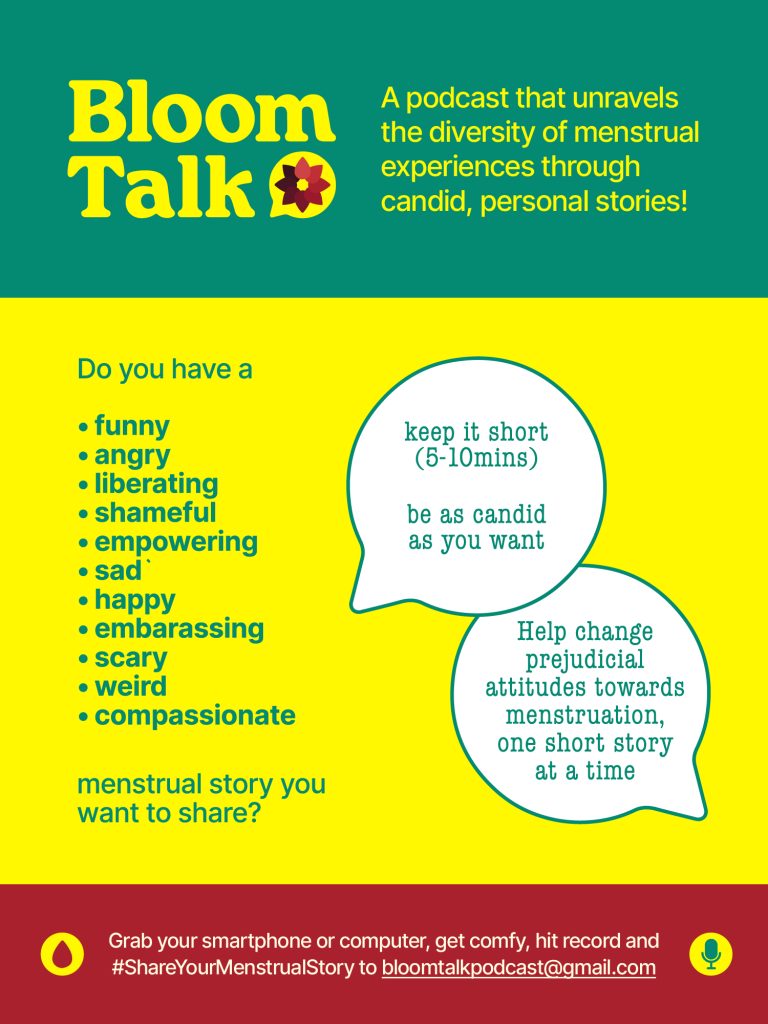
For Season 1 of Bloom Talk, contributors were sourced from within the Emily Carr student community. Interested participants were asked to submit personal stories encapsulating real and honest experiences related to menstruation. Sharing these narratives on a public platform serves the purpose of bursting menstrual myths and taboos, normalising the uniqueness of menstrual experiences, in addition to offering a sense of comfort to those who seek it through listening to another’s story.
The format of an audio podcast–giving participants agency in recording and submitting their stories without the presence of a host/interviewer or a video camera–allows for a level of privacy that empowers uncensored and shame-free sharing of personal menstrual encounters.
#menstrual-podcast #community-building #awareness #activism #healthcare #storytelling #digital #audio
Snippets from Bloom Talk Season 1
(Follow @bloom.talk on Instagram)
Click on the images and videos below to listen to the full episodes.
Impact
The design projects and outcomes developed within this research serve as accessible case studies and toolkits (see link below) of creative communication systems that foster community building to enable healthy, positive, and curiosity-driven attitudes towards menstruation. They stand as practical examples for designing menstrual activism, targeting children and young adults to instigate grassroots advocacy in institutional and community spaces. These design strategies demonstrate the efficacy of participatory design methods in addressing complex menstruation-related challenges, spearheading advocacy initiatives, understanding community perspectives and needs, and potentially even contributing to the formulation of laws safeguarding menstrual rights with the primary goal of eradicating menstrual stigma.
In the span of a few months, Bloom Club emerged as a dynamic force, fostering engagement not only within the Emily Carr University community but also attracting interest from students and researchers across academic institutions in British Columbia. The positive response and encouragement received underscore the potential for the club to persist and expand its role in dismantling menstrual stigma, building the framework for communal approaches to menstrual well-being.
The Bloom Talk podcast has become a transformative platform, amplifying the voices of menstruators, and contributing significantly to breaking societal taboos and building awareness. The poignant and diverse stories shared on the podcast serve as a testament to its ability to empower agency, fostering a sense of community around the misunderstood and stigmatised process of menstruation. Acknowledging the impactful role of branding and visual design for Bloom (both the club and podcast) in lending authenticity and gravitas to the research outcomes, enables this research to transcend the bounds of academia and contribute to the broader design community.
Examining the practice of this research affirms the potential of design in reclaiming agency over the medicalisation of the menstruating body. It showcases the impact of shifting the narrative of menstruation from a problematised condition to an everyday facet of life. Through a design practice led by material explorations and participatory projects, the research has demonstrated the ability to create non-medical literacies around the body, derived from lived experiences, cultural directives, social interactions, and political perspectives. The overarching aim of this research remains resolute–to forge a pathway towards a positive menstrual future characterised by inclusivity, accessibility, and allyship. It seeks not only to cultivate but also to sustain advocacy and activism for the cause of menstruation, envisioning the evolution of a more empathetic society in which menstruators can flourish.
Future
Moving forward, I plan to continue running Bloom Club beyond the Emily Carr community by introducing the concept to interested schools and youth community centres in and around Vancouver. The intention is to establish collaborations with institutions, not-for-profit organisations, and independent sexual health educators for co-designing creative engagements centred on menstrual, sexual, and reproductive health education. Some initial connections have already been forged, and through these collaborations, the aim is to enrich this research by leveraging the creative capacity of design to intersect with healthcare education and awareness.
Plans for Bloom Talk include expanding contributor diversity to encompass individuals who have never menstruated, those whose menstruation status has changed, and older participants (peri-menopausal, menopausal, and post-menopausal). This multifaceted portrayal aims to contribute to the inclusivity objective of the research. Furthermore, the podcast seeks a global reach, inviting contributions in native languages with English-language transcripts to break language barriers and enhance inclusivity. The prospect of developing additional podcast seasons, altering the format and structure, and potentially featuring interviews with grassroots menstrual rights activists, researchers, and medical professionals is anticipated to further contribute to education on menstruation and awareness-raising towards menstrual stigma reduction.
As I conclude my academic journey, I will continue my professional engagements with the ECU Health Design Lab, the Centre for Menstrual Cycle and Ovulation Research, and B.C Women’s Hospital on impactful health-related projects serving the community. These enduring relationships, coupled with my substantial growth as a design researcher, will be instrumental as I navigate the field of social design. Additionally, I have been invited to present my research at the upcoming Periods on Campus Symposium hosted by Concordia University in Montreal on May 17th, where I will present this work virtually at a panel titled ‘It’s Called a Menstrual Cycle! Towards a Sustainable Movement and a Movement Towards Sustainability.’
My goal with this research wasn’t merely academic or professional, it was a personal intent to effect meaningful change through design, that will continue to unfold with every project and interaction in my practice. I look to the future with a deep sense of responsibility, knowing that my work holds the potential to positively impact lived experiences, challenge norms, and ultimately contribute to the cause of women’s equality.


